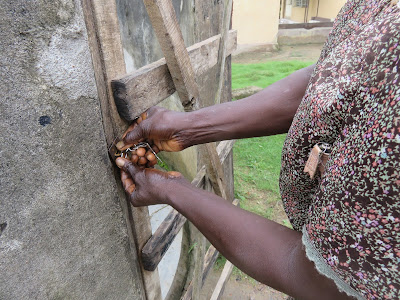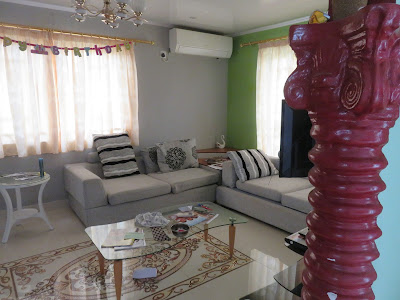Tuesday, July 26, 2016
We departed our very comfortable
hotel at 8 AM, drove by the mission home and picked up a bundle to take with us
to Bo, plus some plastic bags to cover our luggage, and drove to Grafton where
the Carley’s live. We needed the bags to
cover our luggage because of the rain—it will be in the back of Elder Carley’s
truck. Carley’s reside across the small
drive from Sahr Doe (I finally have the spelling right). Sahr owns the entire complex with guarded
gate, which is right across the street from the Church. In the compound they also house several
young, full-time missionaries. Sahr now
occupies two of the houses because of his accident—he has made one of them
wheelchair accessible. He has been getting physical therapy and is showing some
small signs of improvement. It will
probably get a little better when the new equipment arrives that Elder Carley
is having his daughter bring over with her next week. He was being taken care
of when we arrived so we didn’t say hello, but we will probably be able to
visit him when we return. He had so many
visitors that seemed to camp at his house that they had to put up a sign so he
could rest—no more visitors! He is a
wealthy man, but I’m sure he’d give it all up if he could walk again.

Sahr Doe complex; gate ahead.
Front of Carley’s rental house; missionaries in ones near the gate. Sahr across from Carley’s.
It has been raining each day that
we’ve been here, but today it rained harder and more steadily. It only let up a little bit when we arrived
in Kenema. The roads were worse than
ever, or maybe we’ve forgotten—not the highway, but the roads in town. The best thing about the drive was that I
slept a lot of the way. Today I had
woken at 5 AM, so this is a slight improvement on my jetlag problem.
We found the Capitol
Hotel, this time deciding to spend a little bit more money for our stay so we
could have hot water and Internet and TV.
I was so tired of their cold water showers, and it isn’t all that hot right
now with the pounding rain. The pool is
being cleaned so I doubt if it will be functional while we are here.
Amarachi with youngest
boy Jonathan, Jr.
We were eating a late lunch/early
dinner when Jonathan and Amarachi and their kids showed up! It was quite the happy reunion. Amarachi said that it has been about 4
years! They brought their 2 boys, their
adopted daughter, and a niece with them.
At any given time they have 10-20 people camping at their house. It must be quite a challenge. We heard some interesting plans—they see so
much need here that they want to start their own NGO to teach women and girls—morals
for the girls and other skills for the moms.
There is a high pregnancy rate here in this country. There are also a lot of abortions. Since the Mission President and his wife know
about NGO’s and how to start them (Reach the Children), they have been able to
advise them with what might help them to become successful.
We’ve had an enjoyable time
getting to know E/S Carley. They are
doing great, even though they know how difficult it is to be successful here (sustainable water
projects). They are learning good
approaches to the work that will help them greatly in their area water projects. Elder Carley, at the age of 65, walked the
Appalachian Trail, which took a little over 6 months-- it is over 2,000 miles. His wife would mail him food to take with him
along the way. She said he came back a
changed man, for the better. He said he
always loved his wife and children, but learned how to appreciate them, which
he felt was entirely different.
Interesting. This is a second
marriage for him; his first wife died in her 30’s.
Wednesday: I managed to stay
asleep till 7 AM but woke up to more rain.
Last night after a change between
city power and generator here at the hotel, we couldn’t get our air conditioner
back on again—it was late by this time.
We asked for the technician to come but he couldn’t get it to work. The owner came and he couldn’t either, so he
changed our room, and this after we had unpacked everything. Just as the change was nearly completed, he
got it working, but at this point we didn’t want to do it all over again. This
is actually his best room--It actually has a shower door, night stands, and a
few other amenities, even though the rooms are considered to be the same. The one without the shower door had instead a
sloped, roughly tiled floor bottom with a drain, but the drain was not at the
low spot, leaving a puddle in the bottom—this is Africa, after all…
I had forgotten that unless the
city power is on, they turn off their generator by 8 AM. I need to remember this in case I want to
blow dry my hair or charge up my computer or phone. We had
the breakfast that comes with the room and it was okay.
Jonathan picked us up just after
9 AM and we drove in the rain to the police station. They want a well, they need a well, but how
to fund it might be a problem. If they
ask for the neighboring community for help, even though they would use it too,
they might balk because policemen do charge them for violations and they are
not too popular. If they fund it
themselves, the people will be wary of how they plan to do that, by giving more
citations. Either way, this would be an
area project, so Elder Carley will have to decide if he wants do it or not.
Afterwards we drove
to the council office and met with a group of District ministers and other NGO’s. Elder & Sister Carley were skeptical
since they had gone to one of these in Freetown and the district spent the
whole time trying to convince the NGO’s to pay for the district’s trip to
China! Elder Carley had complained and
left the meeting! We were therefore
pleasantly surprised that this meeting was very helpful. The district is trying to map all the water
projects in Kenema and trying to support the NGO’s in what they are doing;
however, they don’t have money like other districts do in other countries, and
they admittedly said that if we wanted their help we’d have to drag them along. Other countries like Ghana give their districts
money, but there isn’t much here yet.
Even today Water Aid sponsored the meeting by providing water, soda and
some cookies to eat. They district
supports the WASH program, but it will be a long while before they can become
as useful as they ought to be. Without
money to operate, they won’t be doing much unless we all pay for them to do
their jobs.

Kenema District meeting with WASH
group and NGO’s.
We drove in the rain again to
Jonathan’s church building, the one that they are meeting in now because he had
to stop and see his workers. I think
they have three branches here in Kenema but Jonathan actually built this building.
They are always repairing it because the
African way of building is not very good, or perhaps it is the materials that they
have to work with. Then we drove to his
home where Amarachi fixed us this lovely chicken and rice meal—it was so
filling that for dinner we just made sandwiches from something Carley’s had
brought from Freetown. It was perfect.
Sister Carley with my
half-dead umbrella standing in front of Jonathan’s Branch building, the one he
built.
While sitting just outside our
rooms, we ate and visited and actually felt cool because of the wind and
rain. It was a good day, but it is
raining too hard in the afternoons to get around to the more difficult places.
Well, off to do some more wash,
shower and then bed. Sometimes I wonder
how we’ll get it all done in the short time that we are here.
Goodbye for now from the Capitol
Hotel in Kenema.



















































